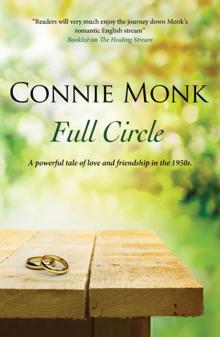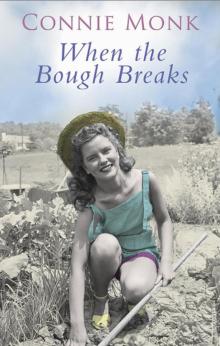- Home
- Connie Monk
The Healing Stream Page 18
The Healing Stream Read online
Page 18
‘Is there a written agreement, what in England we call a lease?’ She gave up the struggle and reverted to her natural tongue.
‘It was a friend-to-friend arrangement. My father and Giles did a shake of their hands.’
For a few seconds Tessa looked around her, seeing into the future. Then she shared her idea with Timus. As they talked, so their enthusiasm grew. Never before, within a couple of hours of Giles leaving her, had she been filled with such excitement.
That was the first time Giles made the journey by road; usually she had driven him to the railway station. But the journey was tedious, with two changes of train before he reached the ferry. Even more than Tessa had realized, he had craved the sense of freedom. It was more than a week before he crossed the channel, for he had no reason to hurry and preferred to deviate from the main roads, engage in conversation with rural folk and spend two nights in Paris before driving on to Calais and thence to Dover. Once he was back in his London apartment he telephoned Tessa, prepared to hear how worried she had been by his long silence and how empty the place was without him.
‘Oh, Giles,’ she greeted him as soon as she recognized his voice, ‘I’ve been hoping you’d phone. I’m so excited. There’s such a lot to tell you. That silly operator won’t keep interrupting, will he?’
What could make her sound like that? Oh, God, no! Surely she wasn’t pregnant again. Tessa’s excited voice soon banished his fear. ‘That five-acre plot the Rodriguez boys use – I thought you had leased it to them. But Timus said it was just an agreement that they could look after the trees and add the almonds to their own.’
‘Are you telling me they want to give up? Damn. They were only interested because it adjoined their boundary. What a—’
‘Stop talking and listen. Giles, I want to use it. Timus says he’ll help me and he’s already taught me an awful lot about looking after the trees.’
‘What the devil would you want with five acres of almonds?’
‘I know no one could make a living on a plot that size.’ Then with a chuckle that seemed to bring her right into the room with him, ‘But I’m not looking to earn my living – I’m a kept woman, remember?’
‘When you talk like that, my sweet Tessa, I wish I were there with you. What the hell am I doing in this noisy, smoky city? Right this minute I could make you forget almond trees . . . make you forget everything . . .’
She was sitting at his desk, something she often did when he was away, as if that would hold him closer. Now she closed her eyes as she heard his words. ‘Giles,’ she whispered, ‘I wish that’s how it could be – right this minute like you said.’ Then, pulling herself back on track, ‘But listen, Giles, I was telling you about the trees and what I want to do. Timus said they will be quite happy not to use this year’s crop so what I mean to do is write to the really posh shops in London. When we harvest them—’
‘We?’
‘Timus and me, that’s the “we”. Giles, my plan is that when we harvest them I shall pack them in red netting bags with, say, three quarters of a pound of nuts in each and with a label attached saying they were grown and packed by me at Finca el Almendros and then the address. It makes them so much more personal for people than just going to a shop and buying any old nuts, not knowing where they’ve come from or anything about them. I could have a picture of the finca on the label. What do you think?’
‘If that’s what you want to do, of course you can. You’re my wife, so it’s your land as much as mine.’
‘But I wouldn’t dream of doing it – well, that’s a lie, I certainly would dream of doing it, but I wouldn’t actually do it if you didn’t agree.’
‘I give you permission to do anything you like. That label, though – it might be a selling point with those “posh shops” you say you want to write to, if you said the nuts were grown and packed at Finca el Almendros, the Spanish home of Giles Lampton, by his wife Tessa. A name people know carries weight.’ He changed the subject. ‘Tessa, I shall be in London for perhaps a couple of weeks and then I thought I’d drive down to have a night or so with Julian. I’ll look in at the farm, too.’
It was only after she’d put the phone down that she realized that until today on hearing that he was going to see Naomi her first thought would have been that she wished she were to be there too. But on that early summer evening her head was too full of plans. Usually, when Giles was away, she ended her days hating the emptiness of his side of the bed, dreaming of when he was home again and he would draw her towards him; that night her mind was in a whirl, it flitted from red netting bags and whether she could buy them or, if not, where she could get them made, to the wording on the labels, to how many bags could be filled from each tree – and finally to what her replies would be from her introductory letters.
Alone on the stile which divided Lower Meadow from the top field where the sheep seemed to watch her with curiosity, Naomi lit another cigarette (her third since she’d been sitting there). She ought to have been aware of how many she’d had, for she and Richard had always been careful never to throw their stubs down. Each time she came to the end, she lit a new one from the burning tip of the old, carefully crushed the old stub against the wood of the stile then, satisfied it was out, put it into the empty packet she kept in her pocket for the purpose.
On that evening she felt too drained to even contemplate what she had agreed. She had done it! The very thing she had vowed she would never do, and now she had given her word. For thirty-seven years this had been her world . . . no, Richard and what they shared here had been her world. So what had been so different about Geoff Huntley’s offer this time? She could have refused out of hand as she had on his two previous visits. It had been when he’d told her that the local man who had been his manager had left and he had advertised in a weekly farming paper for a replacement. The young fellow who he had found to replace him seemed eminently suitable, was just married and needed accommodation. There wasn’t even a tiny cottage empty at Geoff’s farm. Losing the chance of filling the post was what had brought Geoff Huntley to Chagleigh, but it had been something quite different which had taken Naomi by surprise as she had been about to refuse. In her mind had been the day she and Richard had found the neglected and run-down farm. Feeling his presence very close, it had been as though he had put the words in her mouth as she’d given her answer.
‘Chagleigh will be just right for them. This was our first home too. They couldn’t fail to be happy here,’ she had said, with an unexpected sense of deep peace. In the two years without him, never had Richard seemed as close.
The business details had been brief; she and Geoff Huntley had shaken hands on the deal and promised to contact their solicitors immediately. She had agreed to leave the basic furniture and to move out as quickly as the sale could be arranged. She had wanted Huntley gone; she had wanted to recall the moment when she had been so certain of Richard’s presence.
And hours later as daylight faded it was still what she yearned for. She could remember their years so clearly, but remembering is a far cry from the certainty of his nearness. This morning he had been with her, nearer to her than at any time since his death; by evening he was a memory, a dear and precious memory. Jumping from her high seat on top of the stile, she hurried down Lower Meadow trying to escape her sudden, overwhelming loneliness. Ahead of her was the task of sorting out the home that had been their life, leaving items of furniture they had bought at auction sales, the essentials when they were setting up home, other pieces through the years, all of it woven into the pattern of their lives. Now it was all to belong to another young couple. And for her, what was ahead? She couldn’t see ahead; she was frightened to look.
There was a feeling of unreality about what she had done. If only there was someone to tell, but there was no one.
As if to prove her wrong as she crossed the yard she heard footsteps and, with a flood of relief, expected to see Julian. Indeed, one of her visitors was Julian, but the other took her complet
ely by surprise.
‘Giles! How nice!’ Her natural hospitality came to the fore. ‘Tessa told me you were in London when she phoned me while she was at the post office the other day, but I hadn’t expected to see you down here.’
‘Nor I,’ Julian put in. ‘He wanted to come and see you to report to Tessa. I hope I’m not intruding.’ In that post-war era when so many formalities had been abandoned most people in his circumstances would have said, ‘I’m not butting in, am I?’ or something similar. But not Julian; it wouldn’t have been natural for him.
‘I intended to phone you this evening, Julian.’
‘Indeed? Nothing wrong, I hope?’
‘Geoff Huntley came again today.’ And from the way she said it Julian sensed this visit had differed from previous ones. ‘I have agreed. We shook hands on it.’ Then to Giles, ‘You must be wondering what I’m talking about.’ In fact he had been doing no such thing, for the events at Chagleigh Farm weren’t high priority in his life. But Tessa had told him how supportive Naomi had been and that, if he hadn’t been tracked down, she had been willing to make a home for Tessa and his child despite all the holier-than-thou gossip, so he owed her the smile he bestowed on her.
From there on, the evening moved in a direction so unexpected that Naomi felt she was living a dream.
Tessa wrote letters introducing herself to some of the more expensive outlets. She found a producer of the suitably eye-catching red net bags she had envisaged and a printer for the labels, worded as Giles had suggested. Harvesting of the crop wouldn’t be for another three months, but never had she been so excited by a challenge. Money had little to do with the venture; for more than a year her grandmother’s legacy had been safely in the bank. Add to that the fact that Giles had given her free rein to use the five-acre plot as she liked and to her the sky was the limit. But of course reason told her that that was an exaggeration, for how many pounds of nuts could she hope to export from such a small plot? Reason, ambition and excitement have little in common so she discounted reason, concentrated on ambition and found that excitement followed automatically.
It was her habit to telephone to Chagleigh every two weeks or so, but on that occasion when she phoned the line was dead. Worried that something was wrong, she called Fiddlers’ Green and was answered by Deirdre.
‘Yes, Auntie is fine,’ she was assured. ‘I was in the dairy this morning and everything’s OK. There was a really big storm last night; I expect the line is down. I’ll tell her you tried to get her. You know how busy she is, so I’ll pass any news on to her. Now tell me all about Millie.’ When the call ended, Deirdre put the receiver back on its stand with a chuckle. At that moment she saw life as an adventure. But, for her, there were still plenty of other moments, times when she was dragged deep into the mire of misery, when her future held no hope and she saw herself as becoming old and withered like Miss Sherwin, only worse, because at least Miss Sherwin was useful, something she could never be. At twenty years old other girls were meeting people, falling in and out of love. But in the last few days she had become involved in plans, plans that she must keep secret. Beyond that she wasn’t prepared to think.
‘I’m starting back tomorrow,’ Giles said. ‘Tessa, I want to get home to you. How do you put up with me? When I get home everything is perfect, as if you are the balm my restless soul needs. But how long before I chase after the clamour of life that, right now, I just want to leave behind? I’m sorry, sweet Tessa. You deserve so much better than I give you.’
‘Drive fast – but not silly fast. Come home safely. I want you back; I want you to share what I’m planning.’
‘Is that all you want me for?’
‘I want you for everything; you know that. I want us to talk together, walk together, love together—’
‘Is that so far down the list?’ She could hear that teasing note she loved.
‘No. It seemed a bit pushy to put it right at the top,’ she answered in like vein.
‘Sweet Tessa, I do love you. I may not be much of a husband, or father either for that matter, but the one true thing is that I love you.’ It was something he seldom put into words and she felt her eyes sting with tears of emotion she could hardly bear.
‘Giles,’ she whispered, not knowing what she wanted to say and frightened of trying to say anything.
‘Anyway, my sweet,’ he said, moving briskly on. ‘I shall start back tomorrow. But it’s a long drag—’
‘Especially on your own. We could have had such fun if we’d done the trip together.’ But in her heart she knew very well that taking her with him would have defeated the purpose of his escape to his old life.
‘It wouldn’t be the same with a baby in tow. But, anyway, I should be home about five days from now, so get the soil of that almond grove scrubbed off your hands. How’s the typing going?’
Another minute and they had both hung up. From the kitchen came the robust sound of Maria singing what Tessa had come to recognize as a Spanish lullaby. There wasn’t a sound from Millie, who had a rug in her playpen on the stone floor of the kitchen; Millie’s voice usually held her spellbound. Gazing out of the window down the slope to the grove, Tessa felt a sense of peace, of the rightness of where life had brought her. This is where she was born to be, here with Giles, with Millie, with all this – she looked just down the slope but in her mind’s eye, as well, she saw the hills behind her rising into the foothills of the mountains. I wish you could see it, Gran, I wish you could know about Giles and Millie. But perhaps you can. I’m still holding you safe in my heart, so you must know.
By the time the next five days had passed Tessa’s ears were tuned to the slightest sound of a car. Yet when the little convoy turned into the drive she wasn’t at home. She had cycled next door – if having the neighbouring house nearly half a mile further along the road can be called ‘next door’.
The Rodriguez family finca was much larger than el Almendros. Indeed it needed to be, for the family lived the traditional way. When their eldest son, Phillipe, had married no one had expected that he would leave home. Instead Katrina had become one of the family and now the tribe had increased with the birth of each of their two children. Conversation with them had been difficult for Tessa in the beginning, for their knowledge of English was no better than hers of Spanish. In the two years she had been their neighbour they had improved a little and she had improved a lot – in both cases thanks to Timus who had a natural aptitude for languages. On that afternoon she had cycled to the village to post some photographs to Naomi and had called to see if she could bring them anything. Delivering four skeins of white wool should have taken no time at all, but she hadn’t taken into account the fact that Katrina was desperate to share her news. As she held the soft wool against her cheek she was far too excited to school herself into trying to piece together a sentence in English. And even if Tessa couldn’t understand each word she was able to follow the gist of what she was being told.
‘You must have guessed when you knew I would be knitting in white wool. I expect you had noticed that I am to have another child. It will be born in January. I am going to crochet a carrying shawl; the old one is no longer good enough for a new baby.’
‘Gracious! Congratulations. But you’re going to be busy, Katrina. Juan will be not quite three, Francesca just as old as Millie is now and then another.’
Señora Rodriguez, the matriarch, answered before her daughter-in-law had a chance. ‘Babies today are our future for tomorrow. It is good that Katrina is fertile. A good marriage has the gift of many children. It is hoped that you too will be blessed with a proper family, brothers and sisters, tomorrow’s men and women. A home is an empty place without the voices of children. I was sad when our daughter, Sofia, left home to live with her husband and his family. She is far away in Granada. It is her in-laws who are blessed with the sound of the children born of Sofia. Young voices to fill the house, and later, as Marcos and I grow old and our boys take control, we shall be content knowing that
there is another generation growing up.’ Then with a hearty laugh, ‘The almonds will be in good hands.’ As she talked she put her not inconsiderable strength into kneading a great mound of dough for the bread she made each day.
As Tessa pedalled home she thought of the family she’d left, the atmosphere of unchanging continuity in the house. Everybody worked hard but, from the youngest in her pram to Señor Rodriguez working amongst the almond trees and teaching his sons all he knew, they were a team. Briefly she envied them their family ties but almost as the thought took shape it vanished, overtaken by what she saw as she started up the steep slope to the finca. Giles was home! That was her first thought and then she recognized the second vehicle – the hybrid.
Standing on her pedals she forced them with all her might, then dropped her bike unceremoniously and ran indoors.
‘I’m here, I’m home!’ she shouted when she found the living room empty. ‘Where are you?’
Coming up quietly behind her, Giles took her by surprise when he pulled her back against him. ‘Close your eyes and then turn around,’ he said as he might have done to a child.
Tessa did as he said, but with her eyes still closed she drew his head down and found his mouth with hers. Only then did her thoughts go further and she remembered Julian Masters and Deirdre. But when she opened her eyes the first person she saw was Naomi, a Naomi changed and haggard in a way their telephone contact hadn’t hinted. The next few minutes were complete bedlam: they needed the noise and excitement. All of them except Giles, who disappeared to return a few minutes later when the initial hullabaloo had abated a little, carrying a tray with glasses and a bottle of cava, Spain’s answer to France’s champagne.
‘The downstairs bedrooms aren’t very large, Auntie, but it’s best that you and Deirdre use those and the downstairs shower. Mr Masters can have the guest room upstairs.’ Then with a shiver of excitement, ‘I can’t believe it! You don’t know the times I’ve imagined you coming. But who’s looking after Chagleigh?’

 The Healing Stream
The Healing Stream The Fleeting Years
The Fleeting Years Full Circle
Full Circle When the Bough Breaks
When the Bough Breaks